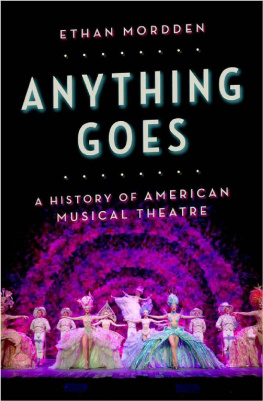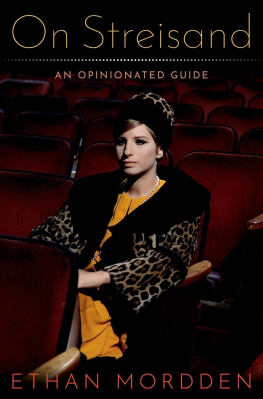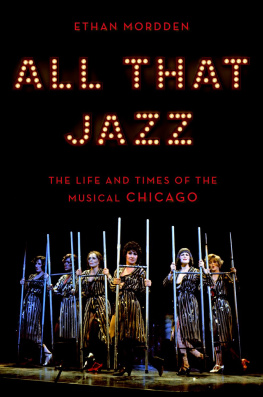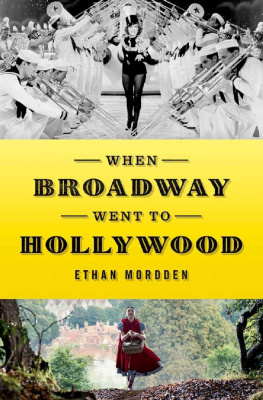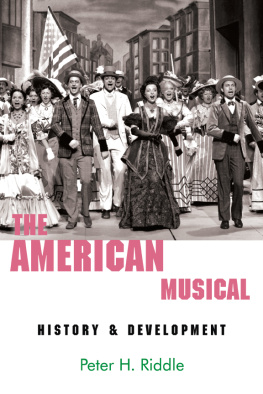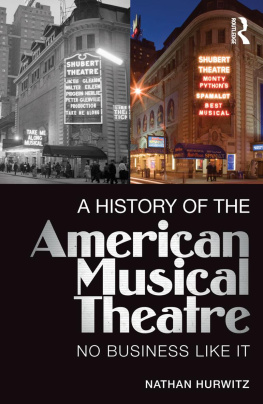Ethan Mordden - Anything Goes: A History of American Musical Theatre
Here you can read online Ethan Mordden - Anything Goes: A History of American Musical Theatre full text of the book (entire story) in english for free. Download pdf and epub, get meaning, cover and reviews about this ebook. year: 2015, publisher: Oxford University Press, genre: Non-fiction. Description of the work, (preface) as well as reviews are available. Best literature library LitArk.com created for fans of good reading and offers a wide selection of genres:
Romance novel
Science fiction
Adventure
Detective
Science
History
Home and family
Prose
Art
Politics
Computer
Non-fiction
Religion
Business
Children
Humor
Choose a favorite category and find really read worthwhile books. Enjoy immersion in the world of imagination, feel the emotions of the characters or learn something new for yourself, make an fascinating discovery.
- Book:Anything Goes: A History of American Musical Theatre
- Author:
- Publisher:Oxford University Press
- Genre:
- Year:2015
- Rating:4 / 5
- Favourites:Add to favourites
- Your mark:
- 80
- 1
- 2
- 3
- 4
- 5
Anything Goes: A History of American Musical Theatre: summary, description and annotation
We offer to read an annotation, description, summary or preface (depends on what the author of the book "Anything Goes: A History of American Musical Theatre" wrote himself). If you haven't found the necessary information about the book — write in the comments, we will try to find it.
Anything Goes: A History of American Musical Theatre — read online for free the complete book (whole text) full work
Below is the text of the book, divided by pages. System saving the place of the last page read, allows you to conveniently read the book "Anything Goes: A History of American Musical Theatre" online for free, without having to search again every time where you left off. Put a bookmark, and you can go to the page where you finished reading at any time.
Font size:
Interval:
Bookmark:
Anything Goes
A History of American Musical Theatre
Ethan Mordden


Oxford University Press is a department of the University of Oxford.
It furthers the Universitys objective of excellence in research,
scholarship, and education by publishing worldwide.
Oxford New York
Auckland Cape Town Dar es Salaam Hong Kong Karachi
Kuala Lumpur Madrid Melbourne Mexico City Nairobi
New Delhi Shanghai Taipei Toronto
With offices in
Argentina Austria Brazil Chile Czech Republic France Greece
Guatemala Hungary Italy Japan Poland Portugal Singapore
South Korea Switzerland Thailand Turkey Ukraine Vietnam
Oxford is a registered trade mark of Oxford University Press
in the UK and certain other countries.
Published in the United States of America by
Oxford University Press
198 Madison Avenue, New York, NY 10016
Ethan Mordden 2013
All rights reserved. No part of this publication may be reproduced, stored in a retrieval system, or transmitted, in any form or by any means, without the prior permission in writing of Oxford University Press, or as expressly permitted by law, by license, or under terms agreed with the appropriate reproduction rights organization. Inquiries concerning reproduction outside the scope of the above should be sent to the Rights Department, Oxford University Press, at the address above.
You must not circulate this work in any other form,
and you must impose this same condition on any acquirer.
Library of Congress Cataloging-in-Publication Data
Mordden, Ethan
Anything goes : a history of the American musical / Ethan Mordden.
pages cm
Includes bibliographical references and index.
Discography: (pages).
ISBN 978-0-19-989283-9 (alk. paper)
1. MusicalsUnited StatesHistory and criticism. I. Title.
ML1711.M732 2013
782.40973dc23 2013000208
Portions of the material on The Wizard of Oz first appeared in The Baum Bugle, Volume 28, Number 3; the Gypsy discography was used, in somewhat different form, in my blog, Cultural Advantages. All illustrations courtesy of the Billy Rose Theatre Collection, The New York Public Library for the Performing Arts, Astor, Lenox, and Tilden Foundations; Culver Pictures; and private collections.
1 3 5 7 9 8 6 4 2
Printed in the United States of America
on acid-free paper
To my faithful agent and friend, Joe Spieler; to Jon Cronwell and Ken Mandelbaum for giving me access to arcane research material; to Anne Kaufman; to Ian Marshall Fisher and Tom Vallance for helping me get close to Mexican Hayride and The Day Before Spring; to wise Geoffrey Block; at Oxford, to my old pal Joellyn Ausanka and my sterling editor, Norm Hirschy.
When the composer-lyricist Frank Loesser became famous, in the middle of the twentieth century, two forms dominated Broadway music theatre, musical comedy and the more ambitious musical play. Loessers form, in Wheres Charley? and Guys and Dolls, was musical comedy. But he wrote his next piece, The Most Happy Fella, as an opera. True, much of it conformed to the practices of musical comedy, for example in the hoot-and-holler dance number Big D and the use of spoken dialogue. However, the romantic portions of the score were extremely lyrical, even ecstatic, and some of the ensemble writing surpassed even the standards of operetta. Then, too, the overture was no song medley but a prelude of leitmotifs, so volatile that it jumps from Allegro giocoso (joyous) to Moderato e misterioso to Largamente (grandiose) to Allegro and so on every few measures, as if only the most expansive composition could prepare the publicnot merely to see a show but to listen to it.
Then the curtain rose on a restaurant at closing time. The music is marked Dolente (pained), but it is actually rather noncommittal in tone, strangely unevocative after, say, Oklahoma!s tiny tone poem of dawn on the prairie or Wonderful Towns orchestral tweaking of a thirties piano riff. But then a vamp breaks in, Pesante (Heavy), in brisk 4/4: grumpy and resentful, the very sound of endless trudging under the weight of laden trays. A waitress takes stage for the evenings first vocal, Ooh! My Feet!, sarcastic and almost bitter yet, in its gamy honesty, likable.
This is Cleo, the sidekick of the heroine, Amy (who is called Rosabella till one spoken line before the shows finale). A customer Amy cant recall has left a note and a bit of jewelry for herobject: matrimonyand, after a longish musical scene with Cleo made of dialogue and arioso mixed together, Amy gets the Heroines Wanting Song, Somebody, Somewhere. It aches with vulnerability, not only in the lyrics but also in the hesitantly soaring music. Partway through it, Amy moves downstage, the traveler curtain closes behind her, and stagehands rush in to clear the restaurant set for the shows first full-stage location and the title song. Now we meet Amys secret admirer, Tony, who is not the shy young man she has imagined but a much older specimen, ebullient and generous at Tempo di Tarentella but, we sadly realize, too unattractive physically for a love plot.
Thus, three songs into the narrative, we are caught up in a worrisome conflict, not least because Amy and Tony have been musically presented to us as appealing personalities. The next number, Standing on the Corner, brings out the musical-comedy Loesser and introduces Cleos incipient mate, Herman. Saturday, he sings, disarmingly, and Im so broke: so he and his buddies hang out and cruise instead of dating. The number is almost pure pop, easy listening in its close-harmony quartetbut Hermans solo sections give us, once again, a character in the tune as well as in the words: affable and eternally optimistic, a soft target for the others to pick on. As two girls pass by, Herman and Clem pointedly look them over, and Clem then tells Herman, Yours was awful!
A plot point: Amy has sent Tony her picture, and he must send his in return. She wont like what she sees, he fears, and now Loesser sings his fifth principal to usJoe, Tonys foreman, a friendly hunk with, nevertheless, something cold and possibly brutal, as Loesser warns in the stage directions, behind the smile in his eyes. Tony is going to send Amy Joes picture, turning his courtship into a fraudbut we dont know that yet. All Loesser gives us is Joey, Joey, Joey, Joes own particular Wanting Song, scored with slithery, unstable harp and celesta runs. The music is sensitive yet dominating: beautiful and disturbing, like Joe himself. And so Loesser concludes his chain of establishing numbers. Now we know everyone in the story, what he or she needs or is capable of.
This is what the American musical had been working up to for some one hundred years, and all its artistry dwells in the historians key buzz term integrated: the union of story and score. Once a mere collection of songs and now a pride of fully developed numbers supported by incidental music, intros and development sections, and musical scenes mixed of speech and song, the score not only tells but probes the story, above all unveiling its characters. As well see, there were integrated American shows around the turn of the twentieth centuryRobin Hood, El Capitan, The Prince of Pilsen, The Red Mill
Next pageFont size:
Interval:
Bookmark:
Similar books «Anything Goes: A History of American Musical Theatre»
Look at similar books to Anything Goes: A History of American Musical Theatre. We have selected literature similar in name and meaning in the hope of providing readers with more options to find new, interesting, not yet read works.
Discussion, reviews of the book Anything Goes: A History of American Musical Theatre and just readers' own opinions. Leave your comments, write what you think about the work, its meaning or the main characters. Specify what exactly you liked and what you didn't like, and why you think so.

